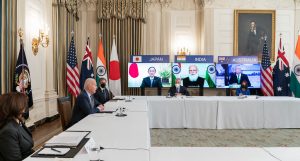U.S. Secretary of State Antony Blinken will be in India on July 27 and 28, and he will meet India’s Prime Minister Narendra Modi, External Affairs Minister S. Jaishankar and National Security Advisor Ajit Doval.
According to India’s Ministry of External Affairs (MEA), “regional and global issues of mutual interest – including recovery from the COVID-19 pandemic, the Indo-Pacific region, Afghanistan and cooperation in the UN” will be the focus of the bilateral discussion.
However, U.S. officials have thrown a spanner in the works by raising a sensitive issue: eroding democratic rights under the Modi government.
Dean Thompson, the acting assistant secretary of state for South and Central Asian affairs, told reporters that the U.S would raise the “human rights and democracy question” with India during Blinken’s visit. Coming on the eve of Blinken’s first visit to India since assuming charge as secretary of state, it could prove a mood dampener.
The visit will pave the way for two important meetings: an in-person Quad summit and a meeting between U.S. President Joe Biden and Modi in Washington, both later this year.
Blinken’s visit comes amid a rapidly deteriorating security situation in Afghanistan and the possibility of the country getting a Taliban government or a Taliban-dominated government growing by the day.
India is apprehensive over the security of its citizens in Afghanistan and the fate of infrastructure and development projects in which it has invested around $3 billion. Importantly, it is concerned over the likely decline in its influence in Kabul should the Taliban come to power.
During Blinken’s visit, the two sides can be expected to discuss possible co-operation in Afghanistan as the security situation there spins out of control.
Incidentally, Blinken’s visit will coincide with that of Afghanistan’s chief of army staff General Wali Mohammad Ahmadzai, who will be in New Delhi between July 27 and 30.
This has triggered speculation over the possibility of the two visiting officials meeting in the Indian capital and prompted discussion of an increased Indian role in Afghanistan, perhaps involving troops.
Blinken’s visit also comes at a time when India is coming out of a deadly second wave of the COVID-19 pandemic. With just 6.8 percent of its population fully vaccinated and a deadlier third wave predicted to strike soon, India is looking to the U.S. for support with vaccines. Indeed, this was the focus of Jaishankar’s visit to the U.S. in May, at the peak of the second wave.
Since March 2020, the U.S. has allotted over $226 million in COVID-19 relief to India of which $100 million came to combat the second wave of infections. American citizens and companies have contributed an additional $400 million worth of COVID-19 relief too.
Although the Biden administration had promised India a share of the 80 million vaccine doses it is providing other countries through the COVAX program, these are yet to reach India as New Delhi has refused to sign a liability waiver that U.S. pharma companies are pressing for.
This is likely to come up for discussion during Blinken’s visit so that promised vaccine doses can flow into India.
A related issue that India will raise is that of supply chains for materials and items required for vaccine production. This is necessary for the success of Quad’s dreams of countering China’s vaccine diplomacy in the Indo-Pacific region.
At the Quad virtual summit in March, the U.S., India, Australia and Japan agreed on India manufacturing U.S. vaccines with Japanese funding and Australian providing logistical support for countries in the Indo-Pacific.
But for India to be able to manufacture the planned billion doses of COVID-19 vaccines by the end of 2022, it will require a steady and reliable supply chain of raw materials. India will therefore press the U.S. to confirm open and consistent supply chains of vaccine raw materials.
Criticism by foreign governments and human rights groups on erosion of civil liberties, democratic rights and religious freedoms in India has usually ruffled New Delhi’s feathers in the past and this time it is no different.
On Sunday, MEA officials told the media that they will apprise Blinken of India’s “achievements” on upholding democratic values. Issues such as human rights and democracy are “universal and extend beyond a particular national or cultural perspective and India is proud of its achievements in both domains and is always glad to share experiences.”
As a “long-standing pluralistic society, India is open to engaging those who now recognize the value of diversity,” the official said.
It does seem that India is all set to go on the offensive should the Americans heckle it on democracy and pluralism.

































